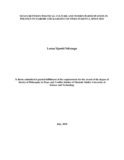| dc.description.abstract | The main aim of this study was to examine the nexus between political culture and women participation in politics since 2013 with a specific reference to Nairobi City and Kajiado Counties in Kenya. The study described two counties in Kenya: one from urban area hence cosmopolitan (Nairobi) and the other one from a rural setting and a bit of its region cosmopolitan (Kajiado). The objectives of the study were (a) to examine the nature of political culture and women participation in politics; (b) to analyse the political culture and women participation in politics and (c) to discuss the challenges women face in political participation in Nairobi and Kajiado counties in Kenya. The study was guided by feminist, social network, postmodernism and political development theories. It used a descriptive survey design where the two counties were described in the nexus between political culture and women participation in politics. Both quantitative and qualitative methods were used. A questionnaire and an interview guide were used. Random and purposive sampling techniques were used to select sample of the study. The study sampled 240 respondents where 190 were female and 50 men since this was a study on women. The analysis of the collected data established that the current political developments did not favor women to contest certain elective posts, as the society viewed the aforementioned posts to be a reserve for their male counterparts. Moreover, the study revealed that decision-making structures were directly in the hands of the males and this hindered the ability of women to make any impact in the political landscape. Further, the analysis of the collected data indicated that it was clear that patriarchal structures within parties, state, and people‟s lives had deleterious effects on the level of political participation by women and that cultural stereotypes labeled against women continued to pervade the county of Kajiado to an extent that women were not viewed as equal to men. Despite the structures put in place by the Kenya‟s constitution, 2010, such as the two-thirds gender rule, the representation of women in leadership positions has been low. Further, the study established that political culture and stereotypes against women influenced their participation in politics. We recommended that men could play a significant role in promoting gender equality policy development and that implementation of the two-thirds gender rule would enhance women participation in politics, as more seats would be reserved for them both at the national and county levels. In addition, we recommended that women should be supported financially and socio-politically as an approach to countering the contemporary political culture and political parties ought to formulate internal structures, which would ensure that women played critical roles because the parties were the vehicles that propelled individuals into leadership. | en_US |

